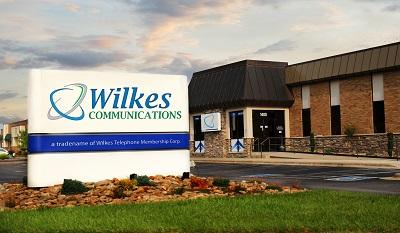By Ashley Spinks, Communications Coordinator, NTCA–The Rural Broadband Association
March 18, 2019
Eric Cramer, chief executive officer of Wilkes Telephone Membership Corp. (Wilkesboro, N.C.), is in relatively uncharted territory in rural North Carolina. On March 5, the fiber provider subsidiary of his RLEC, RiverStreet Networks, announced a groundbreaking new partnership with North Carolina’s Electric Cooperatives, that will expand high-speed internet access to unserved and underserved communities across the state. But for Cramer, this latest development merely feels like coming full circle. “In a way, we’re right back where we started,” Cramer said. “Our cooperative got started to serve [people] who did not have telephone service. Now, instead of telephone, it’s broadband.”
Copper Networks Left Behind
In describing current broadband accessibility in rural parts of North Carolina, Cramer said, “There’s so much of the state that’s underserved. We’re going where there are copper networks that have been left behind … [where larger companies] have made it clear that they’ve basically abandoned any of their upgrade efforts.” In Cramer’s view, internet access is too important an issue to ignore, given the potential of rural broadband to prop up rural economies and improve quality of life for rural residents.
“Long term, what this means is access to telehealth, video conferencing—the economic benefits just from having the fiber in an area is a game-changer,” Cramer explained. “We’ve had multiple counties willing to put up anywhere from 20%–50% in grant funding for fiber projects because they see what this means for education.” Cramer said that in rural communities, deploying broadband has the potential to “touch every single thing in the community,” but it also necessitates collaborating with a wide variety of stakeholders.
In Wilkesboro, N.C., the Wilkes Telephone cooperative has built a robust fiber-to-the-home network and “if we can just recreate what we did there, it’s going to change the economic landscape of rural parts of the state and the region,” Cramer said. But the project is going to be “in conjunction with all the stakeholders in a community, because that’s what it takes.” Cramer cited the local hospital, government, school system, economic development corporation, chamber of commerce and department of transportation as parties that may be involved in a broadband buildout. The newest addition to that list of vested partners, however, is North Carolina’s network of electric cooperatives.
“There’s so much of the state that’s underserved. We’re going where there are copper networks that have been left behind … [where larger companies] have made it clear that they’ve basically abandoned any of their upgrade efforts.”
Cramer lauded the North Carolina Rural Center as an ally of RiverStreet Networks and broadly anyone working in the rural broadband space. The center, Cramer said, is where RiverStreet’s new partnership was born. “[The center] identified broadband as a key initiative of theirs. … They have really helped to foster collaboration between rural stakeholders,” Cramer said. “And that’s kind of where this was born, in their office at a meeting of people just talking about broadband.”
With Them, Not Against Them
Cramer said both RiverStreet Networks and the electric membership cooperatives in the area were seeking a way to improve the quality of life for their respective members, while leveraging the resources each already had and not duplicating efforts. “There were some electrics we had talked to who were looking to get into the business—and if they’re not now, a lot of them will be in the future,” Cramer said. “We would rather work with them than against them.”
The statewide network of North Carolina electric cooperatives had an existing fiber “ring,” Cramer explained, and RiverStreet saw an opportunity to leverage the “dark fiber” in that ring—meaning the extraneous fiber that wasn’t lit or in use. Electric cooperatives often use part of their fiber capacity to connect substations, Cramer said, and RiverStreet offered to partner with these cooperatives wherein the electric could deploy the last mile on its own, while RiverStreet handled “marketing, billing [and] all of the overhead functions,” Cramer explained. He called this the “active” model of partnership.
“They have a long and trusted relationship with their members, and that endorsement alone is priceless.”
In a passive partnership, “We just use their middle mile, and we deploy the last mile. It’s very flexible how we partner. It’s a way for [the electrics] to utilize capital they’ve already put in the ground and solve a problem for their membership, and it lets us do what we do best—building broadband networks.”
Cramer pointed out that the electrics and broadband companies are driven by a common mission and a cooperative vision, and that the electrics already have valuable relationships in the community. “The endorsement of the electric cooperative membership is key,” he said. “They have a long and trusted relationship with their members, and that endorsement alone is priceless.”
This new partnership is poised to have an enormous impact in North Carolina, particularly if the next Connect America Fund (CAF) auction is favorable to the partners. Many of the areas RiverStreet is trying to serve will be eligible for the auction in 2022, Cramer explained. “It’s a long-term project, and where a lot of the money is going to come from is three years from now, so [we’re hoping] to get as much interest as possible before then.” According to Cramer, up to $400 million in CAF funding could be up-for-grabs.
Currently, the electric cooperatives reach 1.2 million households, Cramer said, and “We feel like RiverStreet can get to half a million of them over the next 10 years. That’s how big this could get.” In the meantime, RiverStreet is launching a comprehensive marketing campaign to get North Carolinians excited about the partnership. “We’ve got … billboards, direct mail, radio spots, press releases,” and a website, Cramer said. While some people may have trepidation about electrics getting into the broadband business, “We have to open our minds to doing things a little differently,” Cramer said. “Fortune favors the bold.”


